617 Search Results for tell me about it
April 16, 2013
by Carole Zangari -
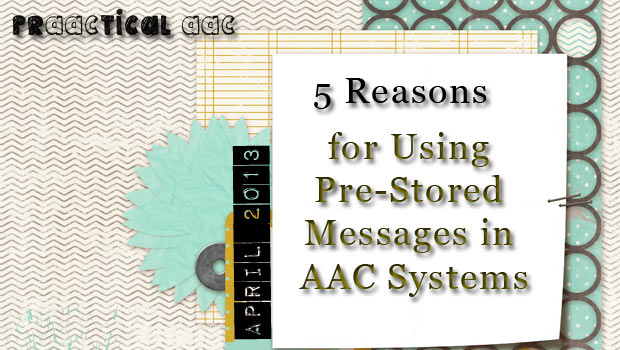
Although we are deeply invested in AAC systems that have a robust set of core language, that doesn’t mean we insist that our clients generate sentences word-by-word all the time. There are lots of good reasons for pre-storing longer messages. Here are some of them. Emergency messages: When we’re communicating about things like spasms, seizures, pain, medication, fear, and danger, time is of the essence. The quicker, the better. Examples: “My asthma is kicking up. Get my puffer, please.” “I’m having a back spasm. Take me out of my chair.” “I think my sugar is off. Can you do a finger prick to check my levels?” “I’m scared. Can you help me?” Partner instructions and communication transaction messages: Sometimes we communicate about communicating. In AAC, it’s not uncommon for someone to set the stage for how the interaction will proceed or provide their partner with specific directions. When communicating to... [Read More...]
March 16, 2013
by Carole Zangari -
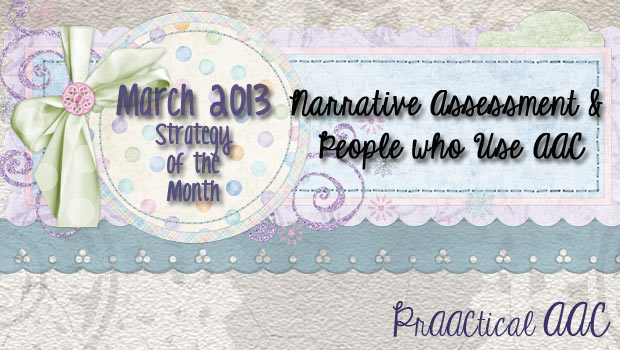
This month, we’ve been talking about building narrative skills in our AAC clients. We tried to build the case that including narrative language goals in our intervention allows us to help people who use AAC to participate more fully in social exchanges, relay more in-depth information, and achieve greater academic success. But how do we know where to start in narrative intervention? And how do we measure progress? In this post, we share some thoughts on the assessment of narrative language in AAC. Most test batteries that assess narrative language are designed to take a snapshot of what the learner has already mastered in terms of telling personal narratives, story retelling, or scripts. This allows us to look beyond MLU, morphology, and grammar and can be useful in determining whether intervention is needed. Some scholars, however, have noted the limitations of this “one shot” approach, particularly for learners whose communication... [Read More...]
March 15, 2013
by Robin Parker -
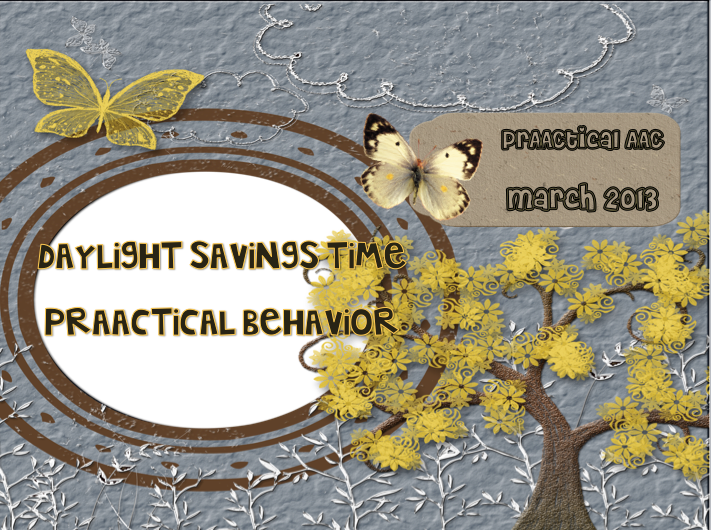
We have noticed that daylight savings time has been difficult for some of the learners that we know (for more about this see Karla Fisher’s ASD page). Sleep patterns seem to have been out of whack which in turn may lead to some re-emergence of behaviors that may pose challenges in speech-language sessions. However, instead of getting frustrated, this is the time to get more organized, teach more high priority communication (“need an extra break today”), and in some ways be more flexible. Be prepared to use the visual supports that keep learners focused, highly interested, and organized. By staying with the basics, there will be no need to sacrifice in AAC & language learning time. Remember to Use: Choice Boards– Give lots of choices. When we choose what we do, we are more likely to be interested and participatory. The session goals can remain the same but a... [Read More...]
March 12, 2013
by Carole Zangari -
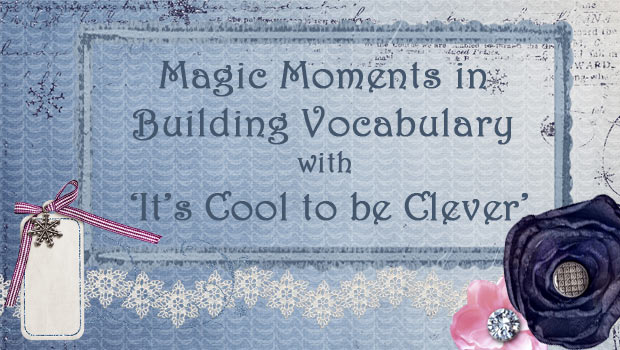
I had such a blast using this great (free) app that I couldn’t wait to get some time to blog about it. ‘It’s Cool to be Clever’ is about being different and uses the story of Edson Hendricks, an innovator who grew up in a small town in Pennsylvania and went on to develop an early design for what we now know as the world wide web. The app is based on a book by a former teacher, Leanne Jones, and contains compelling video and some lovely original music. It was created by Agio Studios. In his own voice, Hendricks tells his personal experiences of growing up feeling different from his peers, family, and community. There are four segments to the app. The Story: Narrated version of Hendrick’s biography, written by Leanne Jones, can be viewed so that you can read on your own, or have it read to you... [Read More...]
January 4, 2013
by Carole Zangari -
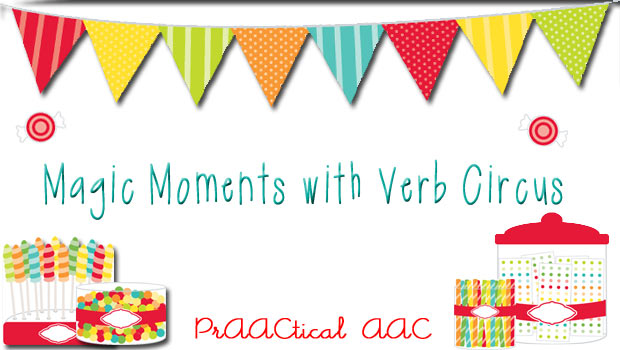
We are so excited to see the expanded web presence by SLPs who are blogging, running groups on Facebook, sharing resources on Pinterest, and maintaining online stores on TeachersPayTeachers. We’ve been thinking about how to connect with some of these creative professionals, both to extend our own professional learning networks and also to broaden the reach of our AAC message. Recently, when an opportunity to forge a few connections presented itself, we decided to collaborate with a few new SLP friends. Periodically, we will be featuring the materials of a fellow SLP who typically writes for colleagues serving primarily children with high incidence disabilities. They post great ideas and materials for students with articulation and phonological difficulties, fluency problems, and language disorders. We hope to put a prAACtical spin on their great ideas. In our inaugural post of this type, we hope to inspire some Magic Moments with fellow SLP Jocelyn... [Read More...]
December 30, 2012
by Carole Zangari -
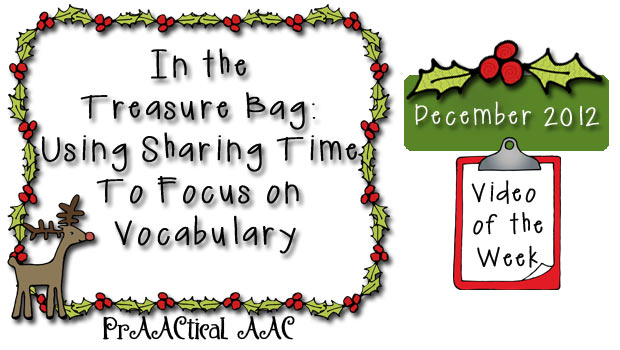
Over the past few months, we’ve been advocating for a multi-stage process for vocabulary teaching that begins with focused (aided) language stimulation and explicit instruction. The approach we described then moves into engaging practice activities while we continue to provide exposure and opportunities for retrieval, with periodic comprehension checks. This cycle allows SLPs to make use of research-based strategies in their semantic intervention and get the best outcomes for their AAC learners. So, when we came across this video about how to use ‘Sharing Time’ to build vocabulary, we knew we wanted to share it. It describes a classroom activity that could also be adapted for therapy groups in which students take turns bringing in an time from home to share with the class. We love the visual support that helps the students know what to talk about. It is a great reminder that visual supports are part of good... [Read More...]
December 25, 2012
by Robin Parker -
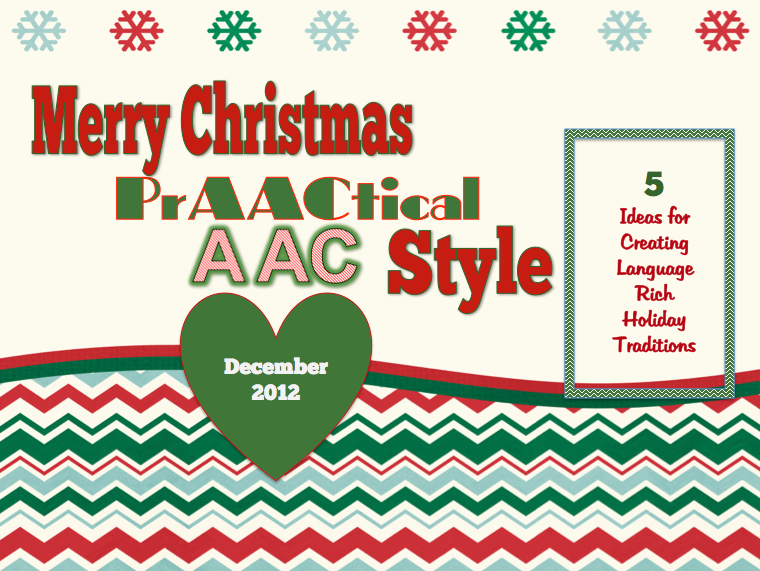
5 Ideas for Creating Language Rich Holiday Traditions The holiday season is a great time to initiate and continue traditions. Since we try to NOT create more work for ourselves if possible, most of our traditions have evolved from activities that helped us at some point. We like holiday traditions because they tend to ease the chaos by building in predictable routines. Each year we talk about traditions (for awhile this was a new vocabulary word), we sometimes write them down, illustrate them, and look at the list at the beginning of the next holiday season. Your family probably has many traditions that might just need to be named and organized. But if you are looking to add some new traditions, here are some of our favorites. If you have any, please share. Photography & Stories– Pictures are a great way to tell a story or talk about... [Read More...]
December 24, 2012
by Carole Zangari -
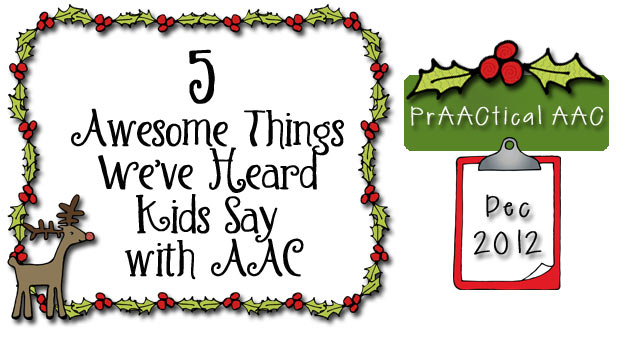
Listen up, friends. Kids are talking with AAC and saying some terrific things. Here are some of our favorites. 1. “Can you scan that, please? It’s on my IEP.” (It’s never too early to learn self-advocacy skills.) 2. “Tell me more.” (We love ‘language magnets!’) 3. “Why [did] you do that to me?” (Hold people accountable. It works.) 4. “No!” (Everyone has the right to express displeasure. Using language rather than behavior to do so gets a big thumbs-up from us.) 5. “You [are] nice.” (Everyone needs a little compliment once in awhile. Folks who know how to give them have an easier time making friends.) How about you? What awesome things have you heard kids say with AAC?
November 29, 2012
by Carole Zangari -
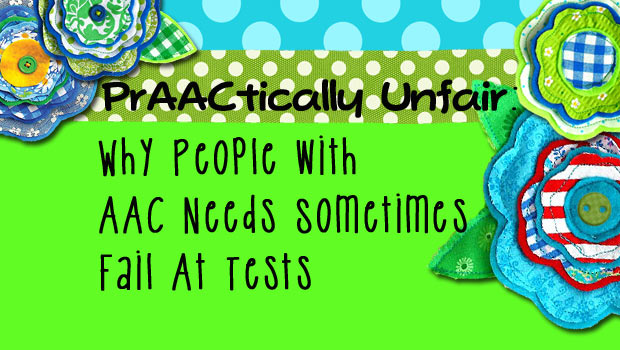
What do these situations have in common? Renting a car with a new GPS system to drive to an interview in a foreign city Hosting a dinner party and cooking a gourmet meal in someone else’s kitchen Using new software to deliver a presentation at a conference If you said they all create anxiety, you’re right. But here’s something else: They all require you to do something unfamiliar or difficult and learn a new tool at the same time and produce results under stressful conditions. We would never put our AAC learners under such stress and expect them to perform well, would we? Of course not! Except when we: Ask them to use an AAC device/app that they are still learning to answer test questions Require them to use a new or exhausting motor pattern to produce a written product for grading Expect students without sufficient test-taking skills to demonstrate... [Read More...]
November 23, 2012
by Carole Zangari -
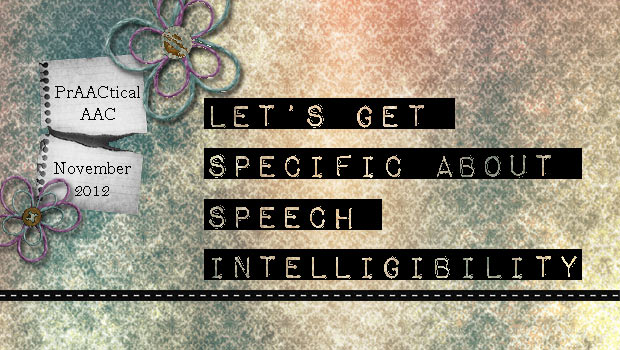
When we’re writing AAC evaluation reports, compiling funding documents, and summarizing the present level of performance in IEPs, we frequently comment on speech intelligibility. In some cases, we’ve administered a standardized assessment instrument and are sharing those results. Often, though, the comments are more descriptive in nature. It is not uncommon to read documentation in which someone with articulation difficulties is described as having speech intelligibility that is mildly, moderately, or severely impaired. Those categories are pretty broad, open to interpretation, and can be quite vague. What do we really mean when saying that someone does or doesn’t have intelligible speech? To narrow down the meaning, we specify the two variables that have the greatest influence on how comprehensible the communicator’s speech output actually is: the context and the communication partner. Specifying whether the context is known and the partner is a familiar one, helps us better interpret the descriptors... [Read More...]









